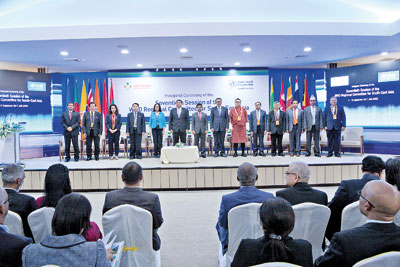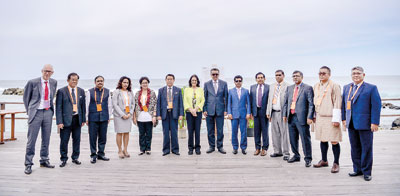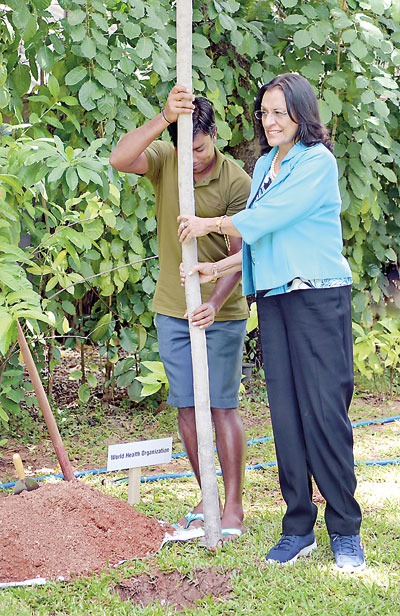News
Climate change heads health agenda
Priorities also include access to essential meds, ending TB, eliminating hepatitis, vector-control and road safety
Climate change was at the top of the agenda as Health Ministers from the region including Sri Lanka met this week in the Maldives for their annual high-level pow-wow to set policy for the coming year.

The Health Ministers smile for the camera after the inauguration of the 70th Regional Committee session of the South-East Asia Region. Sri Lanka’s Health Minister, Dr. Rajitha Senaratne, is third from the right
It was on the overcast morning of September 6 with a hint of rain that the Health Ministers from the South-East Asia Region (SEAR) of the World Health Organization (WHO) convened for the inauguration of the five-day 70th Regional Committee session at Paradise Island Resort on reef-ringed Lankanfinolhu, surrounded by turquoise waters.
With choppy seas and heavy winds being the order of the day and some of the atolls of the Maldives facing the imminent threat of being submerged by the ocean in the future, it was apt that the need for countries in the region to build health systems that are resilient to climate change came out loud and clear from the podium.
More than 200 delegates, including Health Ministers and health officials were in attendance, with an eight-member delegation from Sri Lanka headed by Health Minister Dr. Rajitha Senaratne.
The call from the Maldives, very beautiful but vulnerable to climate change, to act against this real threat and equip countries to be resilient was underscored, with everyone showing their commitment by planting trees after the inauguration and a ministerial roundtable on climate change being organised thereafter. The Male Declaration followed in its wake. (See box)
While acknowledging that a well-prepared and responsive health system is crucial for preventing and minimising the increasing health risks posed by climate change, some of the other priorities that were taken up at the sessions were improving access to essential medicines for all, intensifying efforts to end tuberculosis, vector control in the light of epidemics such as dengue sweeping several countries in the region, eliminating hepatitis and road safety.
“The challenges we all face are real and complex. We are committed to the achievement of Universal Health Coverage (UHC). Every single country is making headway and we have powerful means to measure progress,” reiterated WHO SEAR’s Regional Director Dr. Poonam Khetrapal Singh at the inauguration.
The Regional Committee (RC) is the governing body for WHO SEAR, comprising 11 countries, and meets annually in a member-country to discuss existing and new health priorities, setting the health agenda for the region.
The member-countries are Sri Lanka, Bangladesh, Bhutan, the Democratic People’s Republic of Korea, India, Indonesia, Maldives, Myanmar, Nepal, Thailand and Timor-Leste, where nearly a quarter of the global population lives.
Explaining that UHC is the best and most powerful means we have at our disposal to change people’s lives through better health, Dr. Khetrapal Singh pointed out how sustained investment in health would ensure the continuation of hard-won economic progress.
Adding his voice to her plea, WHO Director-General Dr. Tedros Adhanom Ghebreyesus said that “there is nothing better you can do for the people of your countries than to invest in strengthening your health systems”.
This includes ensuring the right number of health workers with the right skills, in the right places, to give the right care, at the right time. It means ensuring that essential medicines are available and that people do not have to choose between buying medicine and buying food. A strong health system is vital not only to keep people healthy, but also as the best defence against outbreaks and epidemics, said Dr. Adhanom Ghebreyesus, for whom this was the first regional meeting after his recent election as the Director-General.

It is a more relaxed and apt photo-opportunity as the Health Ministers and other officials pose with the sea as a backdrop. Sri Lanka’s Health Minister, Dr. Rajitha Senaratne, is fifth from the right. A top priority for the region is climate change
Handing over the reins of the RC, held earlier by Sri Lanka, to the Maldives, Health Minister Dr. Senaratne turned the spotlight on the fact that the region is grappling with both communicable and non-communicable diseases, while every year there are also disasters such as landslides, floods etc. Hence, in the allocation of resources for health, it is important to take this into consideration.
Urging fellow members in the ‘WHO family’ not to be complacent with their achievements, he stressed that sustaining them will be an important task. “With our limited budgetary allocations and many priority health problems, it is difficult to make a significant allocation to sustain the elimination status of diseases. But as Sri Lanka has experienced twice with malaria elimination and again with leprosy elimination, the moment you let down your defences, these diseases come back in epidemic proportions. Therefore, I request the WHO and other partners in health like the GFATM (Global Fund to fight AIDS, TB and Malaria) to continue their support to member-countries in maintaining a comprehensive surveillance programme.”
Dr. Senaratne, taking up the challenges posed by climate change, requested further strengthening of the mechanism of forecasting its impact on health and implementing a mitigation-mechanism to avoid a post-disaster health hazards, including communicable disease epidemics.
“We need to discuss how the region can contribute to reducing climate change and its effects on the environment,” he said.
Though we are successful in controlling many communicable diseases and were able to achieve many MDG (Millennium Development Goal) health targets or we are well on track to achieving them, the recent epidemic of dengue warned us of our vulnerability, he said, adding that to reach the Sustainable Development Goals (SDGs), the member-countries may need much more technical and other resource inputs, improved efficiency, significant health-sector reforms and more international collaboration than earlier. It is also essential for policy-makers to critically evaluate achievements and challenges.

With climate change being a main focus, Regional Director Dr. Poonam Khetrapal Singh plants a tree after the inauguration
He laid out the “interventions” that Sri Lanka has taken to prevent illness driving people into poverty, such as bringing in a maximum retail price for 48 most commonly used drugs as well as intra-ocular lenses used in cataract surgery and providing cataract lenses and cardiac stents free of charge at government hospitals. The laboratory facilities in government hospitals were fitted with automated machines to tackle large volumes, so that patients get almost all their investigations and lab analysis done in the hospitals.
“We have commenced external quality assurance programmes in all hospitals which ensure reliability of reports. These measures will reduce the out-of-pocket expenditure of the patients which, in turn, provides social justice and safeguards them from getting into the poverty-trap,” said the Minister.
The other important topics Dr. Senaratne touched on are accidents and how the country is focusing on minimising the district/geographical disparities in achieving UHC both by turning the spotlight on hospitals and strengthening the primary healthcare base.
Focusing on the burning issue of NCDs, he laid down the plan being followed by Sri Lanka to prevent as well as control them. With regard to Chronic Kidney Disease of Unknown aetiology (CKDu), Dr. Senaratne lamented that, unfortunately, despite the country’s continuing effort and the help extended by WHO and many others, “we are yet to find the exact cause of this illness”.
Maldivian Health Minister Abdullah Nazim Ibrahim and the Special Envoy of the President of Maldives and Minister of Fisheries and Agriculture, Dr. Mohamed Shainee, also addressed the inauguration.
Last year, the RC was chaired by Sri Lanka, with this year Maldives hosting the sessions. The region has seen many public health achievements: The region-wide elimination of maternal and neonatal tetanus; the elimination of malaria and lymphatic filariasis by both Sri Lanka and the Maldives; the elimination of mother-to-child transmission of the Human Immunodeficiency Virus (HIV) and syphilis by Thailand; the elimination of yaws by India; most-recently the elimination of measles by Bhutan and Maldives; and the elimination of lymphatic filariasis by Thailand.
| Indian head-knock doesn’t faze Rajitha | |
| It was a lighter moment, just before the inauguration of the 70th Regional Committee sessions on Wednesday morning.All delegates had been seated in advance in the hall and Regional Director, Dr. Poonam Khetrapal Singh, brought onto the dais in a wheel-chair as she was recovering from a fractured ankle.Next the Health Ministers, some in their suits and others in their traditional attire, filed in to take their place on the podium. As Health Minister Dr. Rajitha Senaratne walked sedately along the dais to his seat at the far right corner, what he did not envisage was that the organisers were still straightening the flags of the 11 countries. Suddenly, down came a flag along with the flag-pole, rendering a small whack on Dr. Senaratne’s head. There was banter then with a foreign journalist commenting that the “health meeting had turned into a political one”. Unfazed, a smiling Dr. Senaratne patted down his hair and walked with dignity to his seat. Ironically, it was the flag of India! |
| Amitabh Bachchan pleads for an end to hepatitis | |
| Will he or won’t he come was the question on the minds of many – as there had been strident calls for him to boycott the RC sessions. He did not come on Thursday as scheduled, but to make a case for the prevention of viral hepatitis and an end to discrimination against those hit by this disease, he addressed them through a video link. With a passionate plea to eliminate viral hepatitis from the region, WHO Goodwill Ambassador for Hepatitis and popular actor Amitabh Bachchan said that if this ailment is detected in time, there are medications that can halt this virus. “Whatever work we can do to eliminate hepatitis – to detect and cure it – we must do.”This is a moral and social issue. Discrimination against people with hepatitis continues to happen socially in our midst. There are women who are refused marriage, women who are refused the ability to bear children because they have Hepatitis B and there are countries who deny visas to people with hepatitis. Discrimination needs to stop. People must know that there is a cure for hepatitis, he said.Each year, viral hepatitis infects millions of people across the region, which bears one-third of the global hepatitis burden, killing 410,000 people, more than HIV and malaria combined. It is also a major cause of liver cancer and cirrhosis, contributing to premature morbidity and mortality, undermining economic growth. The RC on Friday adopted the regional action plan which includes evidence-based interventions to end viral hepatitis as a public health threat by 2030. |
| Male Declaration on clime change | |
| In recognition of the immense and increasing public health risks caused by climate change, the Regional Committee of WHO’s South-East Asia Region unanimously endorsed the Malé Declaration, committing to build health systems able to anticipate, respond to, cope with, recover from and adapt to climate-related shocks and stress.“Climate change is happening and is a risk to public health. Whether from greater severity and intensity of extreme weather events, changes in the spread and abundance of disease-carrying vectors such as mosquitoes or changes to the physical environment that cause displacement or threaten livelihoods, climate change is already having an impact across our region,” said Regional Director Dr Poonam Khetrapal Singh, adding that the Declaration demonstrates the commitment of the member-countries to take effective and immediate action.The Declaration builds on recent initiatives at country, regional and global levels to tackle the public health risks caused by climate change. It is accompanied by a Framework for Action to be implemented between 2017 and 2022 and calls on UN agencies and other international organizations, development partners, philanthropic agencies and academic and civil society organizations to mobilize human, financial and technical resources for this purpose. The Declaration’s “core” action-points include: Establishing and strengthening climate change and health information systems and research; Integrating climate risks with national disaster risk management;Enhancing health-sector preparedness for climate-related events, including securing essential services such as water and sanitation, waste management and electricity; Initiating the greening of the health-sector by adopting environment-friendly technologies and using energy-efficient services. |

